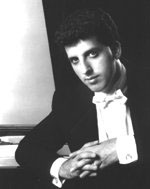 The career of pianist Jeffrey Biegel has been marked by bold, creative achievements and highlighted by a series of firsts. The career of pianist Jeffrey Biegel has been marked by bold, creative achievements and highlighted by a series of firsts.
He performed the first live internet recitals in New York and Amsterdam in 1997 and 1998, enabling him to be seen and heard by a global audience. In 1999, he assembled the largest consortium of orchestras (over 25), to celebrate the millennium with a new concerto composed for him by Ellen Taaffe Zwilich. The piece, entitled 'Millennium Fantasy for Piano and Orchestra', was premiered with the Cincinnati Symphony Orchestra. In 1997, he performed the World Premiere of the restored, original 1924 manuscript of George Gershwin's 'Rhapsody in Blue' with the Boston Pops. Charles Strouse composed a new work titled 'Concerto America' for Biegel, celebrating America and honoring the heroes and events of 9-11. Biegel premiered the piece with the Boston Pops in 2002. He transcribed the first edition of Balakirev's 'Islamey Fantasy' for piano and orchestra, which he premiered with the American Symphony Orchestra in 2001, and edited and recorded the first complete set of all '25 Preludes' by Cesar Cui.
Currently, he is assembling the first global consortium for the new 'Concerto no. 3 for Piano and Orchestra' being composed for him by Lowell Liebermann for 2005-06-07. The World Premiere will take place with the Milwaukee Symphony Orchestra, conducted by Andreas Delfs on May 12-14 2006, followed by the European Premiere with the Schleswig Holstein Symphony Orchestra, conducted by Gerard Oskamp, February 6-9, 2007.
Biegel is currently on the piano faculty at the Brooklyn Conservatory of Music at Brooklyn College, at the City University of New York (CUNY) and the Graduate Center of the City University of New York (CUNY).
|
|
|
|
|
|

Wednesday, August 17, 2005
What Are You Teaching This Semester??
The phone calls have come in--what time is my lesson, Professor? It's always a daunting task--work around their classes--he wants a lesson before our open master class at 2, she wants it after the class to fix her horrific mistakes--they want to sign up for a two piano course--they don't think they can make a solo career--he wants to learn Beethoven 4--she wants to teach chorus in schools, but can't play through a Bach 2-part Invention--help!!!!!!!!!
As I get older, I find more and more that the young people entering the music programs at Brooklyn College and those lucky enough to get into the DMA program at the Graduate Center have dreams that might and might not get realised, and some who have tremendous drive and assurability, and those who have false hope. With all the talk about the industry and the supply and demand wavering from season to season, I become more inquisitive with each student as to their goals, repertoire, and simply 'when you graduate, how do you plan to pay the bills?' mentality. It's like a Reality TV show every week--although I am extremely easy going, with a fire inside trying to help light their way, I am always looking ahead in offering repertoire suggestions that would be helpful for them later on, or career decisions. Some have no clue how limited the openings are for what they do, and they need to carve their niche slowly while in the school mode. True, the classics are important to study, perform and be able to do well, though according to the direction they need to go, I am careful (and cautious, based on their aspirations) to open their eyes and minds to what might be available to them to consider, should that 'classic' career not happen right after they get their diploma. It rarely does anymore. Chamber music, accompanying, composing, teaching, arranging, editing, and so much more is at their disposal. Perhaps we were at the crossroads twenty years ago, and with new technology, there are more possibilities in music today. So, for all the new students and those continuing their studies, keeping your eyes open to the various ways to make music and taking advantage of the avenues that surround you will make it a positive experience, and don't be afraid to learn music from styles that were at one time considered forbidden if you were a 'classical' musician. No holds barred--go for it. Somebody showed me a remarkable book of Dave Brubeck solo piano works--perhaps a Bach Suite followed by a Brubeck Suite--why not??
posted by Jeffrey Biegel
7:48 AM
|
| |



